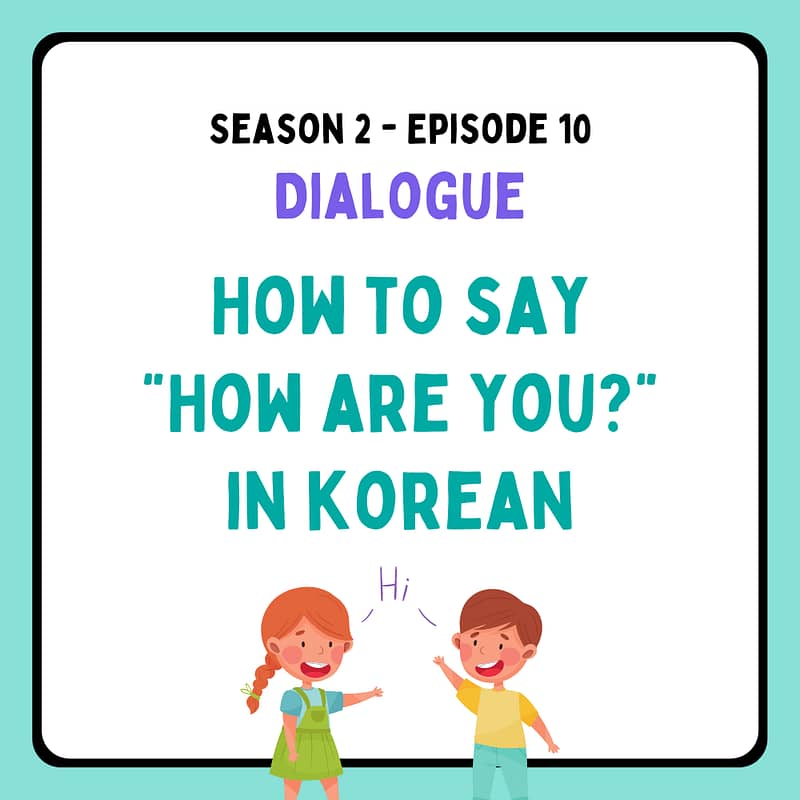Powered by RedCircle
S2.Ep.10. Dialogue How to say “How are you?“ in Korean properly?
Vanessa: 크리스 씨, 안녕하세요? Hi Chris, How are you?
Chris:네, 안녕하세요? Hello,
Vanessa:크리스 씨, 아침은 먹었어요? Chris, Did you have breakfast?
Chris:네, 먹었어요. 바네사 씨는요? Yes, I ate it. What about you, Vanessa?
Vanessa: 네, 저도 먹었어요. I too ate it.
Chris: 그나저나 어제 야근 때문에 너무 피곤해보였는데, 지금은 괜찮아요? By the way, you looked so tired yesterday because of overtime, are you okay now?
Vanessa:네, 괜찮아요. 어제 집에 가서 샤워하고 바로 잤어요. yes I’m okay. Yesterday, I went home and took a shower and went to bed right away.
Chris: 다행이네요. 그나저나 오늘 우리는 무슨 일을 해야 돼요? That’s fortunate. By the way, what do we need to do today?
Vanessa:오늘 우리는 홍보 팀과 회의를 해야 돼요. 지난 주 회의 주제 기억나요? 오늘은 그거에 대해 더 자세히 회의할 거예요. Today we have a meeting with the PR team. Remember last week’s meeting topic? Today we will discuss that in more detail.
Chris: 네, 기억나요. 그럼 회의 준비할게요. Yes, remember. Then I will prepare the meeting accordingly.
…
Chris: 안녕하세요? 잘 지내셨어요? Hello? How are you doing?
Staff: 네, 잘 지냈어요. 크리스 씨하고 바네사 씨도 잘 지내셨어요? Yes. I been well.
How about both of you?
Chris: 네, 저희도 잘 지냈어요. 그럼 회의 시작 할까요? Yes, we also have been well. So shall we start the meeting?
Staff: 네. 그래요. Yes, let’s start.
Okay, We heard a dialogue took place in a workplace between co-workers
In this dialogue, we can learn proper expressions equivalent to How are you in English. Then now, shall we break down the conversation together?
크리스 씨, 안녕하세요?
네, 안녕하세요?
크리스 씨, 아침은 먹었어요?
네, 먹었어요. 바네사 씨는요?
네, 저도 먹었어요.
This dialogue is taken place in a workplace between two co-workers. So these two people see each other almost every day. In English, you say, “How are you?” regardless of whether you see the person every day or not. However, it’s different in Korean, depending on the situation.
In this dialogue, after saying hello to each other, one asked the other this question “아침은 먹었어요? Did you have breakfast?”. This expression is equivalent to the one that we hear more often “밥 먹었어요? Have you eaten? Did you have a meal?” 밥 meal is breakfast in this case. So as you see here, it doesn’t always have to be 밥. It can be 아침 breakfast, 점심 lunch, 저녁 dinner. So as long as it’s related to a meal, then it’s good to go.
About this expression 밥 먹었어요, I already explained the detailed cultural and historical background and the deeper meaning of it in episode 4 of Season 1, right? If you want to know more about it, please listen to episode 4 of season 1.
But even if this expression 밥 먹었어요? Implies the meaning “everything is okay with you?”, you can’t answer this question in an English way like okay, I’m good, or so. You have to answer this one like “네, 먹었어요. Yes, I had it” or “아니요, 아직 안 먹었어요 No, I didn’t have it yet” or “아니요. 근데 곧 먹을 거예요. No, but I will have a meal soon,” and etc.
So to summarize, if you see someone almost every day, the best way to say “How are you” in Korean is “밥 먹었어요?”. Or you can even just skip saying it as well. In Korean culture, it’s not as important as to ask “How are you?” to others like in western cultures. Sometimes, “안녕하세요? Hello” is enough.
All right, then now let’s hear the next part.
그나저나 어제 야근 때문에 너무 피곤해보였는데, 지금은 괜찮아요?
네, 괜찮아요. 어제 집에 가서 샤워하고 바로 잤어요.
다행이네요. 그나저나 오늘 우리는 무슨 일을 해야 돼요?
오늘 우리는 홍보 팀과 회의를 해야 돼요. 지난 주 회의 주제 기억나요? 오늘은 그거에 대해 더 자세히 회의할 거예요.
네, 기억나요. 그럼 회의 준비할게요.
그나저나 어제 야근 때문에 너무 피곤해보였는데 지금은 괜찮아요? By the way, you looked tired yesterday because of working overtime, are you okay now? This part of the conversation is more likely to be used more commonly in everyday conversation compared to the previous one. Like I said earlier, we tend not to ask that question.
Instead, Between people who see almost every day, when it looks like something is not going well with the other or the person looks sick or doesn’t feel great, we tend to ask like “괜찮아요? Are you okay? Or are you feeling okay?” or “무슨 일 있어요? Is everything okay (or literal translation “something’s up?).”
Okay, again, back to the dialogue, so I said 어제 집에 가서 샤워하고 바로 잤어요. I took a shower when I got home and went to sleep right away yesterday. So after knowing she’s okay, Chris said 다행이네요. That’s a relief/good to hear that. This is the most common flow of this kind of conversation. When you think someone close to you doesn’t look great so ask like “Is everything okay? 무슨 일 있어요?”, and after you know the person is okay, then you can say “다행이네요. That’s a relief” to show that you were worried a bit about the person.
All right, now that we know the detailed meaning of some important expressions let’s see what’s going on in this situation. I said 오늘 우리는 홍보 팀과 회의를 해야 돼요. We have to have a meeting with the PR team today. As she said, they will have a meeting soon. Then now, let’s hear the conversation in the meeting.
안녕하세요? 잘 지내셨어요?
네, 잘 지냈어요. 크리스 씨하고 바네사 씨도 잘 지내셨어요?
네, 저희도 잘 지냈어요. 그럼 회의 시작 할까요?
네. 그래요.
Did you hear the expression 잘 지내셨어요? This can be translated into English as “How have you been?” To be more precise, it means “Did you spend your days well/peacefully?” So you can use this when you meet someone in a while so if you say “잘 지내셨어요?” when you see the others every day, or for the first time, it doesn’t make sense.
Then would there be any ways to say “How are you?” properly to someone who you just met? Well, actually, No. Since greeting with saying “How are you?” is not as important as in the western cultures, you can just skip it and saying “반갑습니다 Nice to meet you” is good enough.
Also, this expression 잘 지냈어요? can be changed depending on the level of honorifics. 잘 지내셨습니까? If you speak with the most honorifics
잘 지내셨어요? A little bit less but still very formal, so it’s used between people at the workplace or to some older people who are relatively closer to you, like your grandparents
And then 잘 지냈어요? It’s still polite level, and 반말 casually or informally is 잘 지냈어?
So keep a note of that this expression “잘 지냈어요?” does not always mean “How are you? Or How have you been?”
I’m pretty sure now you guys understand the expression to say “How are you?” in Korean, as well as the alternative ways to say it. 🙂




